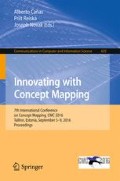Abstract
It has been already justified that concept mapping is an exceptionally suitable tool for formative assessment of structural knowledge. However, before the implementation of such type of assessment, the teacher should decide on a reasonable students’ training strategy, its implementation way, and content to be delivered. The paper focuses especially on the last mentioned issue - the selection of the content and its representational forms for an educational multimedia clip that has been developed as a main tool for students’ self-learning on concept mapping before the regular concept map based formative assessment of structural knowledge in one of the author’s taught study courses. Content requirements and their further implementation in the clip are specified in detail. An empirical study based on students’ evaluation of easiness of perception, internal value, and sufficiency of the content presented in the clip is discussed as well.
Access this chapter
Tax calculation will be finalised at checkout
Purchases are for personal use only
References
Anohina-Naumeca, A.: The conceptual model of formative assessment of structural knowledge. In: Spector, M.J., Lockee, B.B., Childress, M.D. (eds.) Learning, Design, and Technology: An International Compendium of Theory, Research, Practice, and Policy. Springer International Publishing, Switzerland (2016)
Beissner, K.L., Jonassen, D.H., Grabowski, B.L.: Using and selecting graphic techniques to acquire structural knowledge. Perform. Improv. Q. 7(4), 20–38 (1994)
Shavelson, R.J.: Methods for examining representations of a subject-matter structure in a student’s memory. J. Res. Sci. Teach. 11(3), 231–249 (1974)
Trumpower, D.L., Sarwar, G.S.: Effectiveness of structural feedback provided by pathfinder networks. J. Educ. Comput. Res. 43(1), 7–24 (2010)
Black, P., Harrison, C., Lee, C., Marshall, B., Wiliam, D.: Assessment for Learning: Putting It into Practice. Open University Press, Berkshire (2003)
Clariana, R.B.: Multi-decision approaches for eliciting knowledge structure. In: Ifenthaler, D., Pirnay-Dummer, P., Seel, N.M. (eds.) Computer-Based Diagnostics and Systematic Analysis of Knowledge, pp. 41–60. Springer, London (2010)
Curtis, M.B., Davis, M.A.: Assessing knowledge structure in accounting education: an application of pathfinder associative networks. J. Account. Educ. 21(3), 185–195 (2003)
Tsai, C.-C., Huang, C.-M.: Exploring students’ cognitive structures in learning science: a review of relevant methods. J. Biol. Educ. 36(4), 163–169 (2002)
Ausubel, D.P.: The Acquisition and Retention of Knowledge: A Cognitive View. Kluwer, Boston (2000)
Shavelson, R.J., Ruiz-Primo, M.A., Wiley, E.W.: Windows into the mind. High. Educ. 49, 413–430 (2005)
Anohina-Naumeca, A.: Justifying the usage of concept mapping as a tool for the formative assessment of the structural knowledge of engineering students. Knowl. Manag. E-Learn. Int. J. 7(1), 56–72 (2015)
The VARK modalities. http://vark-learn.com/introduction-to-vark/the-vark-modalities/
Rocha, R.L., Pereira, A.O., de Aguiar, J.G., Correia, P.R.M.: How to teach the concept of propositions? A worked-example approach to highlight the need of propositional semantic meaning in concept maps. In: Correia, P.R.M., Malachias, M.E.I., Cañas, A.J., Novak, J.D. (eds.) Concept Mapping to Learn and Innovate, Proceedings of the 6th International Conference on Concept Mapping, pp. 277–282. Escola de Artes, Ciências e Humanidades, São Paulo (2014)
Novak, J.D.: Meaningful learning: the essential factor for conceptual change in limited or inappropriate propositional hierarchies leading to empowerment of learners. Sci. Educ. 86(4), 548–571 (2002)
Goldstein, E.B.: Cognitive Psychology: Connecting Mind, Research, and Everyday Experience. Wadsworth, Belmont (2008)
Quinlan, P., Dyson, B.: Cognitive Psychology. Pearson Education Limited, Harlow (2008)
Rutherford, A.: Long-term memory: encoding to retrieval. In: Braisby, N., Gellatly, A. (eds.) Cognitive Psychology, pp. 269–306. Oxford University Press, Oxford (2005)
Eysenck, M.W., Keane, M.T.: Cognitive Psychology: A Student’s Handbook. Psychology Press, Hove (2000)
Lieberman, D.A.: Human Learning and Memory. Cambridge University Press, New York (2012)
Davis, M., Curtis, M.B., Tschetter, J.D.: Evaluating cognitive training outcomes: validity and utility of structural knowledge assessment. J. Bus. Psychol. 18(2), 191–206 (2003)
Diekhoff, G.M.: Testing through relationship judgments. J. Educ. Psychol. 75(2), 227–233 (1983)
Jonassen, D.H., Beissner, K., Yacci, M.: Structural Knowledge: Techniques for Representing, Conveying, and Acquiring Structural Knowledge. Lawrence Erlbaum Associates, Hillsdale (1993)
Novak, J.D.: Meaningful learning: the essential factor for conceptual change in limited or inappropriate propositional hierarchies leading to empowerment of learners. Sci. Educ. 86, 548–571 (2002)
Novak, J.D., Gowin, D.B.: Learning How to Learn. Cambridge University Press, Cambridge (1984)
Cañas, A.J., Novak, J.D.: Re-examining the foundations for effective use of concept maps. In: Cañas, A.J., Novak, J.D. (eds.) Proceedings of the 2nd International Conference on Concept Mapping, pp. 494–502. Universidad de Costa Rica, San José (2006)
Cañas, A.J., Novak, J.D.: Freedom vs. restriction of content and structure during concept mapping – possibilities and limitations for construction and assessment. In: Cañas, A.J., Novak, J.D., Vanhear, J. (eds.) Concept Maps: Theory, Methodology, Technology, Proceedings of the 5th International Conference on Concept Mapping, pp. 247–257. University of Malta, Valletta (2012)
Cañas, A.J., Novak, J.D.: Concept mapping using CmapTools to enhance meaningful learning. In: Okada, A., Shum, S.J.B., Sherborne, T. (eds.) Knowledge Cartography: Software Tools and Mapping Techniques, pp. 23–45. Springer, London (2014)
Cañas, A.J., Novak, J.D., Reiska, P.: How good is my concept map? Am I a good Cmapper? Knowl. Manag. E-Learn. 7(1), 6–19 (2015)
Acknowledgements
The author thanks her colleague Mara Pudane and her friend Edgars Valinieks for helping in the development of the educational multimedia clip by playing roles of the students.
Author information
Authors and Affiliations
Corresponding author
Editor information
Editors and Affiliations
Rights and permissions
Copyright information
© 2016 Springer International Publishing Switzerland
About this paper
Cite this paper
Anohina-Naumeca, A. (2016). The Educational Multimedia Clip as a Tool for Students’ Self-learning on Concept Mapping. In: Cañas, A., Reiska, P., Novak, J. (eds) Innovating with Concept Mapping. CMC 2016. Communications in Computer and Information Science, vol 635. Springer, Cham. https://doi.org/10.1007/978-3-319-45501-3_16
Download citation
DOI: https://doi.org/10.1007/978-3-319-45501-3_16
Published:
Publisher Name: Springer, Cham
Print ISBN: 978-3-319-45500-6
Online ISBN: 978-3-319-45501-3
eBook Packages: Computer ScienceComputer Science (R0)

